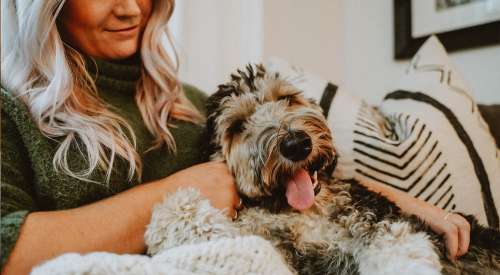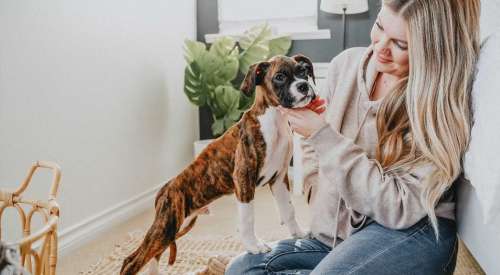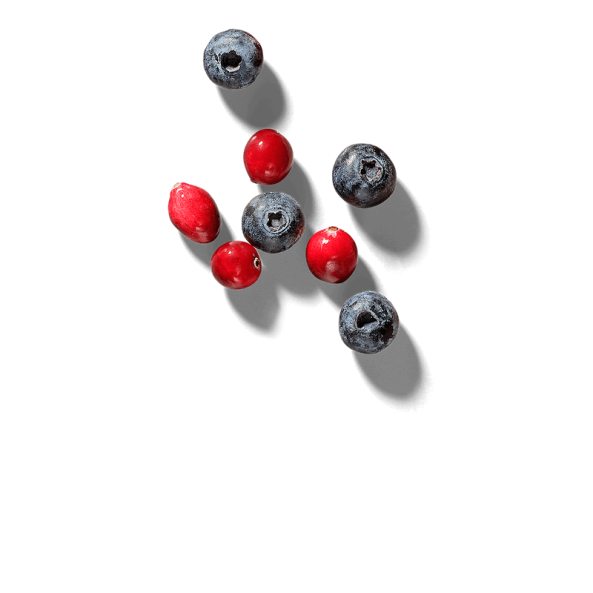April 8, 2024
My Puppy Won't Stop Biting Me, I've Tried Everything!
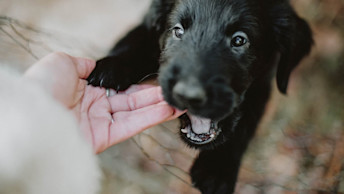
One of the most common challenges new puppy owners have is, “My puppy won’t stop biting me, I’ve tried everything!” or, “My puppy won’t stop biting me and my clothes.” Puppies bite for all sorts of reasons, and often, this part of training is just as essential as teaching your puppy to sit and stay.
An important facet of dog ownership is training. As soon as you bring your puppy home, you should begin training. On top of teaching your dog basic commands, it is also vital that they understand basic puppy manners, including how to behave in the home, what behaviors are appropriate, and what is not.
Getting started can seem a bit overwhelming. But the good news is that in most cases, puppy biting is completely normal and something that is entirely trainable with the right techniques and attitude. In this article, we’ll help you get started on the right foot. If you still have more questions after reading this article, sourcing classes such as Spirit Dog Training’s Ultimate Puppy Program, can help.
Why does my puppy bite me, and how can I prevent it?
Regardless of breed, all puppies explore the world with their mouths. On top of this, like babies, puppies go through a teething process that can last a few months.
Many puppies are used to also playing rough with their littermates, where biting is often a successful way for puppies to get attention or instigate play with their siblings.
Combine this with their need to explore, and this often leads puppies to chewing things they shouldn't: clothes, furniture, shoes, arms, legs.
It is important to understand that your puppy isn’t intentionally being naughty. Puppies have an innate desire to bite and chew and we cannot just “eradicate” this urge. However, we can approach this by offering the puppy plenty of appropriate chew items throughout the day to relieve their desire to chew.

Most owners make the mistake of providing rope toys, squeaky toys, or stuffed animals. While these are fun toys, they do not actually encourage the puppy to chew on them, and oftentimes have bits that are easily torn off, making them a choking hazard.
So, what is a good chew toy for puppies? Good chew toys taste good. If you think about it, a rubber toy tastes like… rubber. No wonder your puppy would rather bite your leather shoe or arm!
When picking chew toys for your dog, look for ones that have a lot of flavor. Our favorites are bully sticks, cow hooves, pig ears or yak chews.
Always ensure your puppy is supervised when they are working through a chew toy, as you never know if/when a small piece could break off and pose a choking hazard.
That said, the more bitey your puppy is, the more frequently you should offer your puppy tasty chew toys as an alternative.
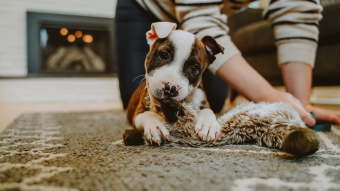
Some breeds have a reputation for being extremely mouthy or predisposed to nipping and biting (for example English Bulldogs, Golden Retrievers, Labradoodles or Bernedoodles). If you have a puppy like this, you should aim to provide them with at least two hours of supervised chewing time a day.
Herding breeds like Border Collies, Australian Cattle Dogs, German Shepherds, and Malinois may also be more nippy, as this class was bred to nip at sheep and cattle to get them moving or people for protection work.
What if my puppy still bites?
Try your best to be patient as you help your puppy work through the unavoidable biting phase. If redirecting their biting with a tasty chew toy doesn’t work, there are other tactics you can try to encourage more appropriate behavior. These ideas include:
Freeze and stuff chew toys
Stuff a rubber chew toy with your puppy’s kibble soaked in water or use wet food to make the toy more enticing. To make them last longer, you can then freeze them to make a “pupsicle”. Puppies that are extremely mouthy can eat every single meal out of a frozen toy like this. While it takes a while to prepare, it will greatly reduce the puppy’s tendency to bite - because he can satisfy the desire to chew so well with his daily meals!
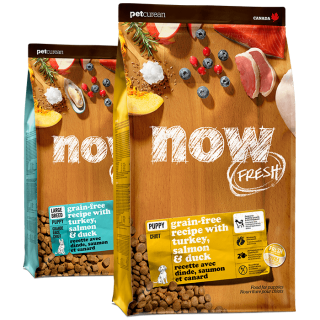
Our Recommendation
Kibble & Wet Food for Puppies
Your new puppy's first year is a time of rapid growth and development. That's why our grain-free puppy food is carefully crafted with fresh meat, fruits, and veggies to support healthy development.
View puppy food
Stop the interaction
When your puppy bites you during play, stop the interaction and ignore your puppy’s behavior. By removing yourself from the situation, you are teaching your puppy that biting does not result in attention or engagement and instead, the fun is over. Don’t make a big deal of it, keep it as non-dramatic as possible. By doing this consistently, you should see an improvement in their biting behavior in a matter of days.
Redirect the behavior
Stop and redirect the inappropriate chewing behavior if you catch your puppy in the act. Whether it’s a shoe, a piece of furniture or even the drywall, quickly provide them with a tasty chew bone or toy to show them what an acceptable alternative is.
Give your puppy plenty of exercise and sleep
Make sure your puppy is getting enough exercise. Often, a puppy may be more nippy if he/she hasn’t had enough physical or mental stimulation. Take your puppy out for some fresh air and a change of scenery; it can make a big difference in your puppy’s at-home behavior. Conversely, puppies need lots of sleep and downtime.
Sleep is often a very overlooked subject in puppies, a general rule of thumb for young puppies (under 4 months) is about 18-20 hrs/day.
If your puppy is overstimulated or overtired, you may find he/she expresses the need for rest by biting and nipping excessively.

Don’t be discouraged if your puppy continues to bite here and there despite your best efforts. It is perfectly normal, developmentally appropriate behavior for puppies until they are around six months of age.
When can I start training my puppy?
You should begin training your puppy the moment you bring them home. This includes teaching your puppy to stop biting, but also to familiarize them with other skills that will be crucial in the long term, like ‘sit’, ‘stay’ or ‘come’.
Puppies begin learning from the moment they are born, especially when it comes to socialization and handling.
Formal training of commands can start at around eight weeks, which is around when your dog is ready to come home. Preferably, you want to get a lot of training done in the first few months that you have your dog.
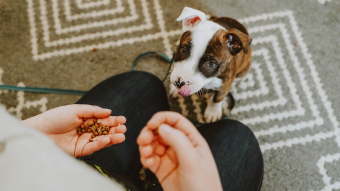
You want your dog to be well trained before they hit puberty, which often causes them to fly off the handle a little bit.
Just like humans, dogs will go through a “teen” stage where they may act a bit more juvenile. Furthermore, what dogs learn in puppyhood is solidified once they become adults.
Waiting will only make your dog harder to train later. For this reason, we highly recommend that you start puppy classes as soon as your dog has their first few shots.
In conclusion
With consistency, time and patience, your puppy will quickly learn that biting people, clothes, or furniture is unacceptable, and that the urge to bite or chew should be satisfied with an appropriate chew toy instead. By providing a safe outlet for their instinct to bite or chew, both you and your puppy will be happier in the long run. For further guidance on how to train your puppy to stop biting, check out Spirit Dog Training's Ultimate Puppy Program!
For more expert dog training tips and advice, visit Spirit Dog Training.



